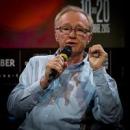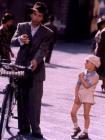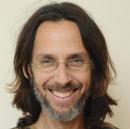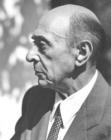לִרְצות, לִרצות -
אני מעֵז
לִרְצות,
אני עוד זוכר -
פחות ופחות -
איך זה לִרצות,
לקַוות,
להאמין
שעוד אפשר להימלט מִגזר הדין - -
*
בתוך הבּועה
הסגורה
שנקראת 'המצב',
שני מִתאבּקים
חָבוּקים, מותשים,
שני מתאבּקים נואשים
וצודקים -
הו, כמה צודקים,
אין סדק בַּצדק,
בתוך הבּועה,
ההֶדק הוא צֶדק
בתוך הבּועה,
זה צַו הגורל שנקרא
'המצב': לא לנשום -
לא לנשום אף לרגע
בשתי הרֵיאות,
לא לצאת
לחופשי,
לא ממש
להיות.
*
לא יהיו לנו חיים
אם לא יהיו להם חיים.
לא יהיו להם חיים
אם לנו לא יהיו חיים.
*
ממהרים להתייאש,
בורחים
כמו מֵאש
מִשְמוּעה על
סיכוי,
מִבְּשורה של
תִקווה,
אבל -
את ממתקֵי המלחמה,
את האיבה,
את השִנאה, הנקמה,
שוב ושוב מוכנים
לנסות,
הילדים
המוּטרפים
של האסון -
לעולם לא מתעייפים,
שוב ושוב מחבּקים את
המוות
כדרך חיים.
*
לרצות, לִרְצות -
אני מעֵז לִרְצות,
אני עוד זוכר
אבל פחות ופחות), איך זה)
לִרצות,
או לקוות,
להִתאוֹות,
להאמין שעוד אפשר
לכתוב
את הסיפור הזה אחרת-
לא יהיו לנו...
אם לא יהיו להם...
לא יהיו להם,
אם לנו לא יהיו...
...שעוד אוּכל להיות
אדם
חופשי,
ועַם חופשי,
בארצי,
בְּבֵיתי,
בתוך נפשי.
*
"...כי הנני בורא שמיים
חדשים וארץ חדשה,
ולא יישָמע בה עוד
קול בכי
וקול זעקה,
לא יהיה משם עוֹד עוּל ימים
וזקֵן אשר לא יְמַלֵא את ימיו,
כי הנער
בן מאה שנה
(ימות". (ישעיהו ס"ה, י"ז
*
וּלגדֵל ילדים
בָּאור, אני רוצֶה,
שלא יטילו צל
על איש,
שלא יכּירו חושך
של כיבוש
ושל טרור -
בָּאוֹר
אני רוצה אותם,
באור,
ביופי
העייף והפגום
של היומיום, בַּנֹוגה
המיטיב
של העתיד-
וּבִנשימה
פתוחה,
שְלֵמה,
של שִיבה לָחיים
אחרי מלחמה.
***
אני מעֵז
לִרְצות,
אני עוד זוכר -
פחות ופחות -
איך זה לִרצות,
לקַוות,
להאמין
שעוד אפשר להימלט מִגזר הדין - -
*
בתוך הבּועה
הסגורה
שנקראת 'המצב',
שני מִתאבּקים
חָבוּקים, מותשים,
שני מתאבּקים נואשים
וצודקים -
הו, כמה צודקים,
אין סדק בַּצדק,
בתוך הבּועה,
ההֶדק הוא צֶדק
בתוך הבּועה,
זה צַו הגורל שנקרא
'המצב': לא לנשום -
לא לנשום אף לרגע
בשתי הרֵיאות,
לא לצאת
לחופשי,
לא ממש
להיות.
*
לא יהיו לנו חיים
אם לא יהיו להם חיים.
לא יהיו להם חיים
אם לנו לא יהיו חיים.
*
ממהרים להתייאש,
בורחים
כמו מֵאש
מִשְמוּעה על
סיכוי,
מִבְּשורה של
תִקווה,
אבל -
את ממתקֵי המלחמה,
את האיבה,
את השִנאה, הנקמה,
שוב ושוב מוכנים
לנסות,
הילדים
המוּטרפים
של האסון -
לעולם לא מתעייפים,
שוב ושוב מחבּקים את
המוות
כדרך חיים.
*
לרצות, לִרְצות -
אני מעֵז לִרְצות,
אני עוד זוכר
אבל פחות ופחות), איך זה)
לִרצות,
או לקוות,
להִתאוֹות,
להאמין שעוד אפשר
לכתוב
את הסיפור הזה אחרת-
לא יהיו לנו...
אם לא יהיו להם...
לא יהיו להם,
אם לנו לא יהיו...
...שעוד אוּכל להיות
אדם
חופשי,
ועַם חופשי,
בארצי,
בְּבֵיתי,
בתוך נפשי.
*
"...כי הנני בורא שמיים
חדשים וארץ חדשה,
ולא יישָמע בה עוד
קול בכי
וקול זעקה,
לא יהיה משם עוֹד עוּל ימים
וזקֵן אשר לא יְמַלֵא את ימיו,
כי הנער
בן מאה שנה
(ימות". (ישעיהו ס"ה, י"ז
*
וּלגדֵל ילדים
בָּאור, אני רוצֶה,
שלא יטילו צל
על איש,
שלא יכּירו חושך
של כיבוש
ושל טרור -
בָּאוֹר
אני רוצה אותם,
באור,
ביופי
העייף והפגום
של היומיום, בַּנֹוגה
המיטיב
של העתיד-
וּבִנשימה
פתוחה,
שְלֵמה,
של שִיבה לָחיים
אחרי מלחמה.
***
Language: Arabic
Il testo in lingua araba
Arabic Lyrics
Arabic Translation by: AlTayeb Ghanayem
Accompanying Text Translator: Ahmad AlJafari
Translator of IN THE LIGHT and Translation Advisor: Suha Kadry
Arabic Lyrics
حالات/ دافيد غروسمان ©2017
ترجمة: الطّيّب غنايم
ترجمة: الطّيّب غنايم
Arabic Translation by: AlTayeb Ghanayem
Accompanying Text Translator: Ahmad AlJafari
Translator of IN THE LIGHT and Translation Advisor: Suha Kadry
ثَمّة وضع
أن أرغبَ، أن أريدَ –
أن أتجرّأَ
أن أريدَ،
لا زلتُ أذكرُ –
أقلَّ فأقلَّ –
كيف يعني أن تريدَ،
أن تأْمَلَ،
أن تؤمنَ
أنّ بالإمكان لا يزالُ بإمكانِكَ التَّملُّص
من الحُكْم - -
*
في الفُقاعة
المُغْلَقة
المدعُوّة "وضع"،
ثمَّتَ متصارعان
محتَضِنَان، مُنهَكَان،
متصارعان يائسان
وعادلان –
ويا لهما من عادِلَيْنِ،
لا شُقَّ في الشّرخ،
في الفقاعةِ
الزّنادُ هو العدلُ،
في الفقاعةِ،
هذا هو قدرُ الله، المسمّى
"الوضع": أَلَّا تَتَنَفَّسَ –
أَلَّا تَتَنَفَّسَ ولو للحظة
بِرِئَتَيْكَ،
ألّا تَنْطَلِقَ
نحو الحريّة،
وألّا تكون
بالفِعْلِ
موجودًا.
*
لن نحظى بحياةٍ
إنْ لم يحْظَوْا بحياةْ.
لن يَحْظَوْا بحياةٍ
إن لم نَحْظَ بحياةْ.
*
نسارعُ لليأس،
نهربُ
كالفارِّ من نارٍ
من سُمعةٍ حول
احتمالٍ،
من بُشرى
أَمَلٍ،
لكن -
حلوى الحرب،
والضّغينة،
الكراهية، الانتقام،
مرارًا وتكرارًا، نستعدّ
أن نخوض تجربتها،
الأبناءُ
المُلتَاثِين بالمصائب –
لا يَكِلُّوا أَبَدًا،
مرارًا وتِكرارًا يحتضنون
الموتَ
نهجَ حياةٍ.
*
أن أُريدَ –
أَتَجَرّأُ على الرّغبة،
لا زلتُ أذكرُ
لكن أقلَّ فأقلَّ (ماذا يعني
أن ترغب،
أن تأمَلَ،
أن تشتهي،
أن تؤمن أنّه لا زال بالإمكان
كتابة
هذه الحكاية بطريقة مغايرة –
لن نحظى...
إن لم يحظوا...
لن يحظوا،
إن لم نحْظَ...
... لأقدرَ أن أكونَ
إنسانًا
حرًّا،
وشعبًا حرًّا،
في بلادي،
في بيتي،
في روحي.
*
... " لأني هأنذا خالق سماوات جديدة
وأرضًا جديدة،
ولا يُسْمَعُ بعدُ فيها
صوتُ بكاءٍ
ولا صوت صراخ،
لاَ يَكُونُ بَعْدُ هُنَاكَ طِفْلُ أَيَّامٍ،
وَلاَ شَيْخٌ لَمْ يُكْمِلْ أَيَّامَهُ.
لأَنَّ الصَّبِيَّ
يَمُوتُ ابْنَ مِئَةِ سَنَةٍ"
سفر إشعياء
*
وأريدُ أن أرّبي أولادي
في النّور، أريدُ،
ألّا يظلموا أحدًا،
ألّا يعرِفُوا ظلمةَ
الاحتلال
والإرهاب –
في الّنور
أريدُهم،
في النّور، في الأيّام
ذات الجمال
المُنْهَكِ والمعطوب،
وفي الهالة التي تجمّل المستقبل –
في النّور أريدُهُم،
في النّور.
في النّور أُريدُهم،
في النّور،
وفي نَفَسِ
منشَرِحٍ،
كاملٍ،
نَفَسِ العودةِ إلى الحياة
بعدَ حربٍ.
***
أن أرغبَ، أن أريدَ –
أن أتجرّأَ
أن أريدَ،
لا زلتُ أذكرُ –
أقلَّ فأقلَّ –
كيف يعني أن تريدَ،
أن تأْمَلَ،
أن تؤمنَ
أنّ بالإمكان لا يزالُ بإمكانِكَ التَّملُّص
من الحُكْم - -
*
في الفُقاعة
المُغْلَقة
المدعُوّة "وضع"،
ثمَّتَ متصارعان
محتَضِنَان، مُنهَكَان،
متصارعان يائسان
وعادلان –
ويا لهما من عادِلَيْنِ،
لا شُقَّ في الشّرخ،
في الفقاعةِ
الزّنادُ هو العدلُ،
في الفقاعةِ،
هذا هو قدرُ الله، المسمّى
"الوضع": أَلَّا تَتَنَفَّسَ –
أَلَّا تَتَنَفَّسَ ولو للحظة
بِرِئَتَيْكَ،
ألّا تَنْطَلِقَ
نحو الحريّة،
وألّا تكون
بالفِعْلِ
موجودًا.
*
لن نحظى بحياةٍ
إنْ لم يحْظَوْا بحياةْ.
لن يَحْظَوْا بحياةٍ
إن لم نَحْظَ بحياةْ.
*
نسارعُ لليأس،
نهربُ
كالفارِّ من نارٍ
من سُمعةٍ حول
احتمالٍ،
من بُشرى
أَمَلٍ،
لكن -
حلوى الحرب،
والضّغينة،
الكراهية، الانتقام،
مرارًا وتكرارًا، نستعدّ
أن نخوض تجربتها،
الأبناءُ
المُلتَاثِين بالمصائب –
لا يَكِلُّوا أَبَدًا،
مرارًا وتِكرارًا يحتضنون
الموتَ
نهجَ حياةٍ.
*
أن أُريدَ –
أَتَجَرّأُ على الرّغبة،
لا زلتُ أذكرُ
لكن أقلَّ فأقلَّ (ماذا يعني
أن ترغب،
أن تأمَلَ،
أن تشتهي،
أن تؤمن أنّه لا زال بالإمكان
كتابة
هذه الحكاية بطريقة مغايرة –
لن نحظى...
إن لم يحظوا...
لن يحظوا،
إن لم نحْظَ...
... لأقدرَ أن أكونَ
إنسانًا
حرًّا،
وشعبًا حرًّا،
في بلادي،
في بيتي،
في روحي.
*
... " لأني هأنذا خالق سماوات جديدة
وأرضًا جديدة،
ولا يُسْمَعُ بعدُ فيها
صوتُ بكاءٍ
ولا صوت صراخ،
لاَ يَكُونُ بَعْدُ هُنَاكَ طِفْلُ أَيَّامٍ،
وَلاَ شَيْخٌ لَمْ يُكْمِلْ أَيَّامَهُ.
لأَنَّ الصَّبِيَّ
يَمُوتُ ابْنَ مِئَةِ سَنَةٍ"
سفر إشعياء
*
وأريدُ أن أرّبي أولادي
في النّور، أريدُ،
ألّا يظلموا أحدًا،
ألّا يعرِفُوا ظلمةَ
الاحتلال
والإرهاب –
في الّنور
أريدُهم،
في النّور، في الأيّام
ذات الجمال
المُنْهَكِ والمعطوب،
وفي الهالة التي تجمّل المستقبل –
في النّور أريدُهُم،
في النّور.
في النّور أُريدُهم،
في النّور،
وفي نَفَسِ
منشَرِحٍ،
كاملٍ،
نَفَسِ العودةِ إلى الحياة
بعدَ حربٍ.
***
Contributed by Riccardo Venturi - 2017/9/1 - 07:01
Language: English
Il testo in lingua inglese
English lyrics
English lyrics
The Situation / David Grossman ©2017
From Hebrew: Jessica Cohen
From Hebrew: Jessica Cohen
THE SITUATION
To want, to want –
I dare
to want,
I still recall –
though less and less –
what it’s like to want,
to hope,
to believe,
that we can still escape
this fate.
*
Inside the
sealed bubble
that we call ‘the situation’,
two wrestlers stand,
arms locked, exhausted,
both desperate
and both right –
Oh, so right,
so right there’s no light
inside the bubble.
Might is right
inside the bubble.
It’s our destiny,
called ‘the situation’ –
Don’t breathe,
not even once,
not with both lungs.
Don’t ever
be free,
don’t really
be.
*
We can never have our lives,
If they do not have their lives.
They can never have their lives,
If we do not have our lives.
*
Quick to despair,
we turn and run
from rumors of
a chance,
from word of
hope.
But the candies of war –
the enmity,
the hatred,
the revenge –
they want to taste them
again and again,
the frenzied children
of catastrophe.
They never tire,
they keep embracing
death
as a way of life.
*
To want, to want –
I dare to want,
I still recall
(but less and less)
what it’s like
to want,
to hope,
to yearn,
and to believe we can still
write this story
differently.
To believe
that I will yet be
a free man,
a free people,
in my country,
in my home,
inside my soul.
*
“…for behold, I create new heavens and a new earth;
and the voice of weeping shall be no more heard in her,
nor the voice of crying.
There shall be no more thence an infant of days,
nor an old man, that hath not filled his days;
for the youngest shall die a hundred years old.” (Isaiah 65:17-20)
*
I want to raise children
in the light,
so that their shadow falls
on no one,
so that they never know the darkness
of occupation
and of terror.
In the light,
I want them.
In the light,
in the weary, blemished beauty
of the day-to-day.
In the gentle glow
of the future.
In the light, I want them
in the light,
with the full,
open breath
of returning to life
after a war.
To want, to want –
I dare
to want,
I still recall –
though less and less –
what it’s like to want,
to hope,
to believe,
that we can still escape
this fate.
*
Inside the
sealed bubble
that we call ‘the situation’,
two wrestlers stand,
arms locked, exhausted,
both desperate
and both right –
Oh, so right,
so right there’s no light
inside the bubble.
Might is right
inside the bubble.
It’s our destiny,
called ‘the situation’ –
Don’t breathe,
not even once,
not with both lungs.
Don’t ever
be free,
don’t really
be.
*
We can never have our lives,
If they do not have their lives.
They can never have their lives,
If we do not have our lives.
*
Quick to despair,
we turn and run
from rumors of
a chance,
from word of
hope.
But the candies of war –
the enmity,
the hatred,
the revenge –
they want to taste them
again and again,
the frenzied children
of catastrophe.
They never tire,
they keep embracing
death
as a way of life.
*
To want, to want –
I dare to want,
I still recall
(but less and less)
what it’s like
to want,
to hope,
to yearn,
and to believe we can still
write this story
differently.
To believe
that I will yet be
a free man,
a free people,
in my country,
in my home,
inside my soul.
*
“…for behold, I create new heavens and a new earth;
and the voice of weeping shall be no more heard in her,
nor the voice of crying.
There shall be no more thence an infant of days,
nor an old man, that hath not filled his days;
for the youngest shall die a hundred years old.” (Isaiah 65:17-20)
*
I want to raise children
in the light,
so that their shadow falls
on no one,
so that they never know the darkness
of occupation
and of terror.
In the light,
I want them.
In the light,
in the weary, blemished beauty
of the day-to-day.
In the gentle glow
of the future.
In the light, I want them
in the light,
with the full,
open breath
of returning to life
after a war.
Contributed by Riccardo Venturi - 2017/9/2 - 11:09
×
![]()
Note for non-Italian users: Sorry, though the interface of this website is translated into English, most commentaries and biographies are in Italian and/or in other languages like French, German, Spanish, Russian etc.







[2017]
yeshmatsav.co.il
ניהול אמנותי: שאנן סטריט, יוני רכטר
ניהול מוסיקלי: יוני רכטר
הפקה מוסיקלית: יוני רכטר, עמי רייס
וידאו ארט ובימוי וידאו: מיכל רובנר
1. לרצות: לחן: יוני רכטר, שאנן סטריט, הדג נחש.
עיבוד: הדג נחש, יוני רכטר, שאנן סטריט, עמי רייס.
2. שמיים חדשים: לחן: דניאל זמיר, יוני רכטר, שאנן סטריט.
עיבוד: דניאל זמיר, יוני רכטר, שאנן סטריט, עמי רייס.
3. באור: לחן: ברי סחרוף, יוני רכטר, שאנן סטריט.
עיבוד: ברי סחרוף, יוני רכטר, שאנן סטריט, עמי רייס.
יש מצב / דויד גרוסמן
كلمات : دافيد غروسمان
إدارة فنيّة : شأْنان ستريت، يوني ريختر
إدارة موسيقيّة: يوني ريختر
إنتاج موسيقي : يوني ريختر، عامي رايس
فيديو آرت وإخراج الفيديو: ميخال روبنير
لحن:
1. أن نرغب: يوني ريختر، شأنان ستريت، هداغ نحاش
تنفيذ: هداغ نحاش، يوني ريختر، شأنان ستريت، عامي رايس.
2. سماء جديدة: لحن: دانييل زامير، يوني ريختر، شأنان ستريت.
تنفيذ: دانيئيل زمير، يوني ريختر، شأنان ستريت، عامي رايس.
3. في النّور: لحن: بيري سحروف، يوني ريختر، شأنان ستريت.
تنفيذ: بيري سحروف، يوني ريختر، شأنان ستريت.
Words: David Grossman
Artistic directors: Sha'anan streett and Yoni Rechter
Music director: Yoni Rechter
Music producers: Yoni Rechter, Ami Reiss
Video Art and Video Director: Michal Rovner
1.TO WANT:
Composed by: Yoni Rechter, Sha'anan Streett, HaDag Nahash
Arranged by: HaDag Nachash Yoni Rechter,Sha’anan Streett, Ami Reiss
2.NEW HEAVENS:
Composed by: Daniel Zamir, Yoni Rechter, Sha’anann Streett
Arranged by: Daniel Zamir, Yoni Rechter, Sha’anann Streett, Ami Reiss
3.IN THE LIGHT:
Composed by: Berry Sakharof, Yoni Rechter, Sha'anan Streett
Arranged by: Berry Sakharof, Yoni Rechter, Sha'anan Streett, Ami Reiss
דויד גרוסמן, הדג נחש, יוני רכטר, דניאל זמיר, ברי סחרוף, מקהלת הנוער של ימק"א, גליה ירון, המפיק המוסיקלי עמי רייס והאמנית מיכל רובנר, ביצירה משותפת. על מה השיר? על המצב, על מה שהתרגלנו לקרוא לו 'המצב'. הלבבות נאטמו מול מאמרים והפגנות. האוזניים נסתמו. נוצרה פה שפה חדשה, סִכְסוּכית, והיא כבר לא אומרת כלום לאף אחד. חשבנו- אולי שיר יעזור, יעיר, יניע את הנפשות שנלכדו בתוך הבועה הסגורה של המצב. ("...זה צו הגורל / שנקרא 'המצב'.
לא לנשום - / לא לנשום אף לרגע / בשתי הריאות /לא לצאת לחופשי/ לא ממש להיות...") כתבנו, הלחנּו, צירפנו צירופים, הבאנו חברים, אמרנו - הייאוש זה מותרות שאנחנו לא יכולים להרשות לעצמנו. זמזמנו: לא יהיו לנו חיים, אם לא יהיו להם חיים. הפכנו את זה וראינו שגם ההפך נכון. לא יהיו להם חיים אם לנו לא יהיו. ככול שיצרנו, הרגשנו שיש בנו תנועה, שלא מוכרחים להתמכר לייאוש. אפשר גם להתמסר לתקווה. קטנה, מציאותית, במידת אדם. כזאת שאפשר לשיר אותה גם בעברית וגם בערבית. גם בדברי הנחמה של הנביא ישעיהו, שמבטיח שבארץ החדשה שתיבָּנה, הנערים יחיו מאה שנה; וגם במשאלה הקטנה שלנו, לגדל ילדים באור, שלא יטילו צל על איש. באור אני רוצה אותם, באור. האם זה שיר אחד שמורכב משלושה שירים? האם הם שלושה נפרדים שחוברו להם? הכול אפשרי, השיר הזה מוכן לכול. דויד גרוסמן כתב את המילים ואליהן באו יוני רכטר, שהלחין עם שאנן סטריט ו'הדג נחש', וברי סחרוף, ודניאל זמיר. ובאו גם מקהלת הנוער של ימקא, וגליה ירון, והמפיק המוסיקלי עמי רייס, והאמנית מיכל רובנר, שמלווה במבטה את העבודה כולה. זה השיר שיצרנו. הדרך שלנו לבקש דבר פשוט: שעוד אוכל להיות אדם חופשי, ועַם חופשי, בארצי, בביתי, בתוך נפשי
ثَمّة وضع
دافيد غروسمان، هَدَاغ نَحَاش، يوني ريختر، دانييل زامير، بيري سخروف، غاليا يارون، جوقة الشّبيبة التّابعة لجمعيّة الشّبّان المسيحيّة والفنّانة ميخال روبنير، في إنتاج مُشترك. عَمَّ تتحدّث القصيدة؟ عن الوضع، عمَّا اعتدنا تسميته "الوضع". أُوصِدَت القلوب حيال المقالات والمظاهرات. صُمَّت الآذان. خُلقت هنا لغة جديدة، لغة صراع، وهي لم تَعُد تعني شيئًا لأحد. فكّرنا – ربما بإمكان القصيدة أن تمدّ يدَ العوْن، تحرّك النّفوس التي اُسِرَت في فقاعة الوضع المُفْرَغَة. ("...هذا هو قدر الله / المُسمّى "الوضع"/ ألّا تتنفّس- /ألّا تتنفّس ولو للحظة / بالرّئتين/ ألّا تنطلق نحو الحرّيّة / ألّا تكون بالفعل موجودًا...")
كتبنا، قمنا بالتّلحين، ودعونا أصدقاء، وقُلنا – اليأس تَرَفٌ لا يمكننا أن نسمح لأنفسنا به. دندنّا: لن نحظى بحياةٍ إن لم يحظوْا بحياةٍ . وعكسنا الجملة واكتشفنا أنّ العكس أيضًا صحيح. لن يحظوْا بحياةٍ إن لم نحظَ بحياة. وكُلما أنتجنا، شَعَرْنا بحركة داخلنا، وبأنّنا لسنا مضطرّين لإدمان اليأس. يمكن أن نسلّم أنفسنا للأمل. أمل صغير، واقعيّ، بحجم الإنسان. بحيث يمكن غناؤه بالعربيّة والعبريّة كذلك. وكذلك في أقوال المواساة للنّبي إشعياء، الذي يعد بأن يعيش الشّباب في البلد الذي سيُبنى مائة سنة؛ وأيضًا في أمنيتنا الصّغيرة، أن نربّي الأطفال في النّور، ألّا يظلّلوا على أحدٍ. في الّنور أريدهم، في الّنور.
هل هي قصيدة واحدة مكوّنة من ثلاث قصائد؟ هل هي ثلاث قصائد منفصلة جُمِعَت معًا، كلّ الاحتمالات ممكنة، هذه القصيدة تحتمل كل التّأويلات . دافيد غروسمان كتب الكلمات التي تناولَهَا يوني ريختر، ولحّنَها مع شأْنان ستريت و "هداغ نحاش"، وبيري سخروف، ودانييل زامير، لتأتي جوقة الشّبيبة في جمعيّة الشّبّان المسيحيّة، وغاليا يارون، والمنتج الموسيقي عامي رايس، والفنّانة ميخال روبنير، التي تشرف على العمل كلّه. هذه الأغنية التي أنتجناها، طريقتنا في طلب شيء بسيط: أن يتسنّى لي أن أكون إنسانًا حرًّا، وشعبًا حرًّا، في بلادي، في بيتي، في روحي.
The Situation
A collaborative project by David Grossman, HaDag Nahash, Yoni Rechter, Daniel Zamir, Berry Sakharof, YMCA Jerusalem Youth Chorus, Galia Yaron, musical producer Ami Reiss and artist Michal Rovner. What is this song about? The situation we live in, what we have grown accustomed to calling "HAMATZAV" - The Situation. Hearts have hardened in the face of endless commentaries and demonstrations. We have grown deaf. A new language has come into being, a language of conflict, that says nothing to anyone. We thought perhaps a song would help, would move the souls that have been trapped in the sealed bubble of "the situation". (“…It’s our destiny, called ‘the situation’ – don’t breathe, not even once, not with both lungs. Don’t ever be free, don’t really be…") We wrote, we composed, we weaved constellations, we enlisted friends, and we kept telling ourselves that this despair is a luxury we cannot afford. We hummed: We can never have our lives, if they do not have their lives. We reversed it and found it to be equally true. They can never have their lives, if we do not have our lives. The more we created, the more we felt a shift within ourselves - we do not have to be addicted to despair, we can be devoted to hope. Small, but realistic and on a human scale: a song that can be sung in Arabic and in Hebrew. As in the consoling words of Prophet Isaiah, who promises that in the new land that will be built, the youngest shall die one hundred years old; and of our own humble wish to raise our children in the light, so that their shadow is cast on no one. In the light I want them, in the light. Is this one song comprised out of three? Are these three separate songs woven together? Everything is possible, this poem is prepared for anything. David Grossman wrote the words, joined by Yoni Rechter who composed the music along with Sha'anan Streett and Hadag Nahash, Berry Sakharof and Daniel Zamir. The YMCA Jerusalem Youth Chorus and Galia Yaron collaborated with the musical producer Ami Reiss, and the artist Michal Rovner, whose aesthetic gaze follows the entire creation. This is the poem we created. Our way of asking for something simple: That I will yet be a free man, a free people, in my country, in my home, inside my soul.
Ciononostante, nello spirito di testimonianza e di documentazione che è caratteristica della “sezione ebraica” di questo sito (ebraica nel senso linguistico, chiaramente), non si può certo fare a meno di inserire la Yesh matsav di Grossman, corredata con le sue versioni (araba e inglese). Ci piacerebbe però, in un modo o nell'altro, riuscire a sapere come è stata realmente percepita in Palestina, naturalmente se lo è stata. Il sospetto, lo ripeto, è che quasi nessuno se la sia filata, né in ebraico e né in arabo. A dire il vero, nemmeno Repubblica ci ha insistito tanto. Neppure un commento di Roberto Saviano, il che è tutto dire data la sua propensione filosionista. Noialtri, invece, da bravi e indefessi rompiscatole quali siamo, la inseriamo coscienziosamente e la commentiamo con un certo qual spirito critico, che poi è il reale succo della “Situazione”. Buon ascolto, e buon insediamento. [RV]